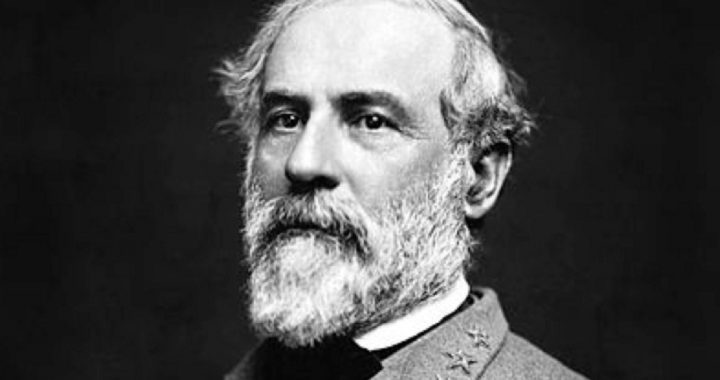
In an article clearly designed to smear the Confederate generals for whom many American army posts were named for — such as Fort Bragg in North Carolina and Fort Hood in Texas — Associated Press writer Dan Sewell even felt it was necessary to distort the record of the greatest Confederate general, Robert E. Lee (shown), in his effort.
As part of the Taliban-like push to tear down monuments and rename schools, army posts, and otherwise flush certain history down the Orwellian memory hole, Sewell and others evidently consider it acceptable to tell their readers half-truths (or no truth at all) in order to accomplish their mission.
When the Civil War was over, the nation was deeply divided. President Abraham Lincoln’s avowed purpose in prosecuting a war that led to the deaths of at least 600,000 soldiers North and South was to “save the Union.” To Lincoln, it did no good to accomplish that feat if the sections remained embittered after the war. His goal of a rapid reconciliation was cut short by his assassination, but following Reconstruction, others who shared his views looked for ways to, as Lincoln had put it in his second inaugural address, “bind up the nation’s wounds.”
One of the ways to do this was to name U.S. army posts in the former Confederate States after prominent Confederate generals, such Braxton Bragg, John Bell Hood — and Robert Edward Lee. President Donald Trump’s secretary of Housing, Ben Carson (who is black and was one of the nation’s most gifted surgeons before running for president in 2016), said Sunday on Fox News that changing the names now would have “exactly the opposite effect.”
But reconciliation is not the tone of Sewell’s article, in which he writes that these generals “were not only on the losing side of rebellion against the United States, some weren’t even considered good generals.” Of course, it is easy to sit back and criticize military decisions made more than 150 years ago, but had those generals had the financial and population resources of the Union side of the conflict, they could have probably overcome those inadequacies.
Union general after Union general failed to defeat Lee (Lee even whipped a force twice his size at the Battle of Chancellorsville), and the main reason that U.S. Grant was finally able to triumph over him was not superior generalship, but rather overwhelming superiority in manpower and resources. Sewell noted Lee’s failure at Gettysburg with Pickett’s Charge, but Grant lost 7,000 men in mere minutes in a frontal assault at Cold Harbor.
But perhaps worst of all, Sewell slanders Lee’s good name by omission of certain facts and by failing to present an alternative historical viewpoint, all in one sentence, in which he wrote, “Lee has been portrayed in the South as a gentlemanly hero, but he had been a slaveholder in his native Virginia and at least one of his former slaves testified that Lee had him whipped brutally.”
First of all, Lee was revered as a great general and a great man not only in the South, but in the North. For example, when Lee died in 1870, the New York Herald wrote, “We have long since ceased to look upon him as the Confederate leader, but have claimed and recorded his triumphs as our own.… Robert E. Lee was an American, and the great nation which gave him birth would be today unworthy of such a son if she regarded him lightly.”
Lee’s ownership of slaves came about because he inherited slaves through his wife from his father-in-law. The terms of the will made it practically impossible for Lee to free them immediately. As Douglas Southall Freeman wrote in his Pulitzer Prize-winning, four-volume biography, R.E. Lee, the will contained a provision that only when all of his father-in-law’s debts were paid off, were the slaves to be emancipated. The crushing debt of $10,000 was eventually paid off, and Lee filed for the manumission of the slaves in Henrico County, pronouncing them “forever set free from slavery,” on December 29, 1862. Lee’s alternatives before that was either to default on the debts, which would have caused the slaves to continue in slavery under a new master, or just sell them. Lee chose to do neither, which would have left them enslaved, but freed them as soon as he could.
Lee, in an 1856 letter to his wife from Camp Brown in Texas, had made his opposition to slavery quite clear. “I believe,” Lee wrote, “in this enlightened age, there are few who will not acknowledge that slavery as an institution is a moral and political evil.”
Freeman, after extensive research, also concluded that Lee had never had a slave undergo corporal punishment. “There is no evidence, direct or indirect, that Lee ever had them or any other Negroes flogged.”
With articles such as Sewell’s, it is not surprising that the average person has a warped view of Robert E. Lee, in particular, and the Civil War, in general. Such twisted reporting is a testimony that what passes for “reporting” today is more the perpetuation of falsehoods so as to advance a certain political viewpoint.
Photo of Robert E. Lee: Library of Congress via Wikimedia
Steve Byas is a university history and government instructor and the author of History’s Greatest Libels, a book which challenges many of the falsehoods leveled at certain historical figures, such as George Washington, Thomas Jefferson, Joe McCarthy, Marie Antoinette, and Clarence Thomas. He may be contacted at [email protected].



